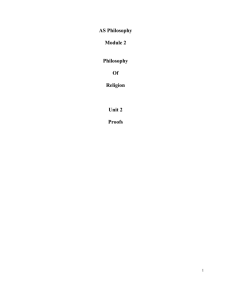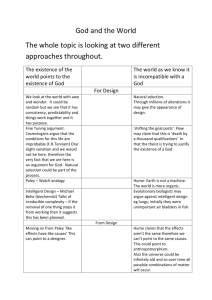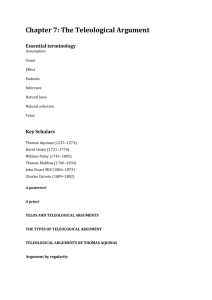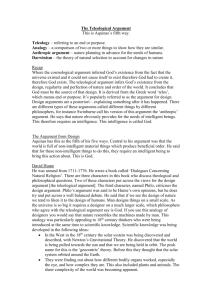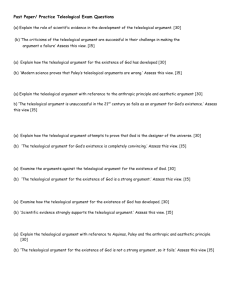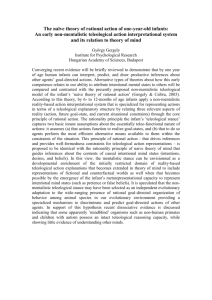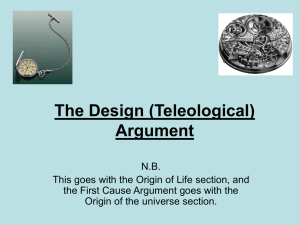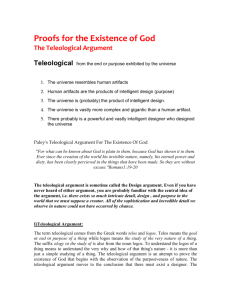Citicisms Of Teleo
advertisement
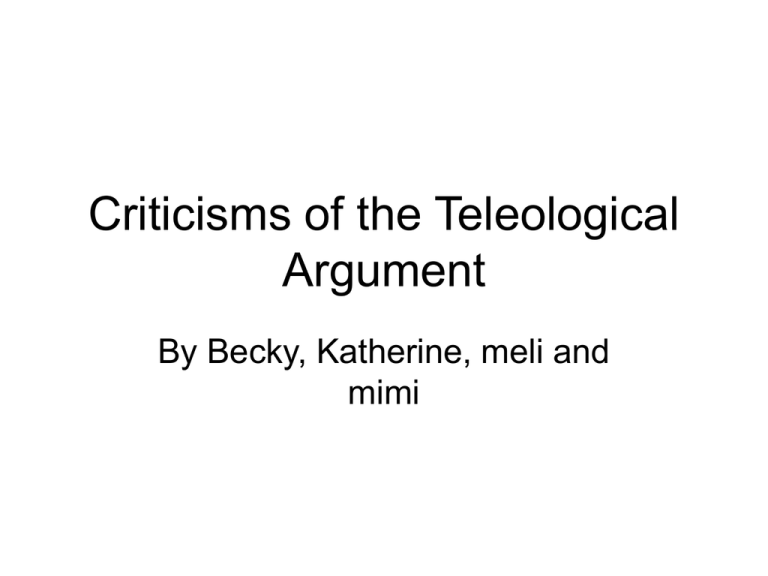
Criticisms of the Teleological Argument By Becky, Katherine, meli and mimi • The Teleological argument has received many criticisms, the most famous coming from David Hume, John Stuart Mill and Charles Darwin. David Hume • David Hume criticised the Teleological argument in his book published in 1779 named “Dialogues Concerning Natural Religion” Hume's Arguments were based around the following points: • As humans our knowledge and experience of the origins of the world are so limited we cannot conclude that there is only one designer, if a designer at all. • God transcends human understanding and cannot be limited to a human analogy. • The analogy themselves are flawed as a manufactured item is more likely to come from many hands rather than just one. • The ordered world could have come from a designer but also by random chance (the epicurean hypothesis explains this) • David Hume is very famous for arguing that even if there was a designer, who is to say this designer is the superior being above all others when the world could have just been “the first rude essay of some infant deity who afterwards abandoned it”. In other words, the teleological argument does necessarily correspond with the god of Christianity if a god at all according to Hume. John Stuart Mill • Mill was more commonly known for his work on ethics and liberty but in his book “the nature and the utility of religion” published in 1874 he raised some important criticisms to the teleological argument. • Mill was also an empiricist so knowledge had tobe grounded by experience. Mill’s main points are: • As suffering is in the world the designer could not have been all loving and an all-loving designer would not have allowed human suffering in the design. • This means that the attributes of the god of Christianity and classical theism do not meet the god proposed by the teleological argument as the presence of evil and suffering seem to indicate a fault in the design. Charles Darwin • Charles Darwin was a naturalist who formulated the theory of natural selection in his work “the origins of species” published in 1859. His work developed from studying species on the various Galapagos Islands on the HMS Beagle voyage, and expanding work written by Thomas Mathus. Darwin's Theory provided an alternative to the teleological argument in the following ways: • He stated that the teleological argument was not the only explanation for how each aspect of the universe seems to be perfectly designed for the job it does. His theory of evolution and natural selection shows how animals and plants may adapt over time to their habitat and lifestyle. For example, birds on one island had beaks adapted to break nuts, where as a similar species on a different island had beaks to aid eating worms. • This seems to continue on from Hume’s arguments who stated it was possible for order to come from random chance, but did not have the evidence that Darwin had to explain it. • Therefore, everything is more well adapted to its environment because it has been tailored over time. Those animals which have not survived failed to successfully adapt. Conclusions • The teleological argument does successfully describe why the universe may have been designed by something but it does not necessarily mean this designer was the god of Christianity or classical theism. This is because the argument leaps from saying the world was designed to saying this was only one god, who was also all powerful and loving. As beings on this world we do not have sufficient knowledge to conclude that the world was designed at all, let alone by the attributes listed in Christianity. Also, Darwin’s theory shows a viable alternative to the design argument but explaining how things may have become as adapted as they have. THE END!!!! Thank you for watching
